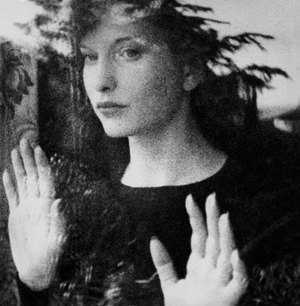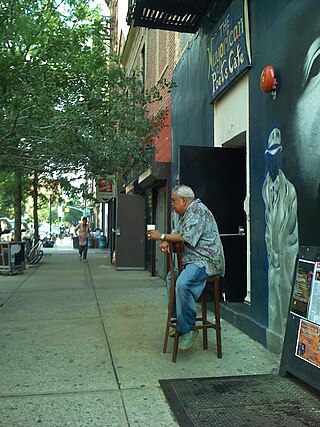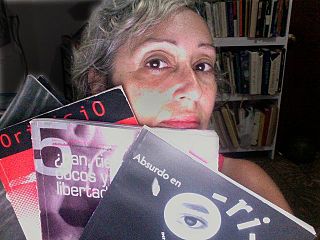Edin Velez | |
|---|---|
| Born | |
| Known for | Video Art , Director |
Edin Velez is a Puerto Rican video artist, director and professor. [1] [2] He is best known for his work on the documentary films State of Rest and Motion and Dance of Darkness. [3] [4]
Edin Velez | |
|---|---|
| Born | |
| Known for | Video Art , Director |
Edin Velez is a Puerto Rican video artist, director and professor. [1] [2] He is best known for his work on the documentary films State of Rest and Motion and Dance of Darkness. [3] [4]
Edin was born and raised in Puerto Rico and is currently based in New York. He studied painting at the University of Puerto Rico and the Institute of Puerto Rican Culture. [5] He moved to the US in the early 1970s and became part of the first generation of video artists working in SoHo, Manhattan. [6] [7] His directorial debut documentary film on Japanese Butoh, Dance of Darkness, was broadcast nationally in the US by PBS. [8] He is a professor and coordinator of the video program at Rutgers University–Newark. [9]
Edin has received numerous award, including American Film Institute's Maya Deren Award, fellowships from the Guggenheim Foundation, the U.S./Japan Friendship Commission, the Jerome Foundation and the New York State Council on the Arts. [10] [11] [12]
Edin's work has been featured in numerous group exhibitions in such institutions as the Whitney Museum of American Art, Centre Georges Pompidou, documenta 8, American Film Institute National Video Festival, Museum of Modern Art and International Center of Photography. [13] [14] [15]
This section of a biography of a living person needs additional citations for verification .(April 2019) |
| Year | Film | Director | Cinematographer | Notes |
|---|---|---|---|---|
| 2017 | State of Rest and Motion | Editor and producer | ||
| 2012 | My Brooklyn | |||
| 2009 | Never Enough | |||
| 2009 | RFK in the Land of Apartheid | |||
| 2007 | A Certain Foolish Consistency | Producer | ||
| 2002 | This and That, and other Minor Misunderstandings | Editor and producer | ||
| 1995 | Memory of Fire | |||
| 1992 | Art on Film, Program 3: Form | |||
| 1990 | A Mosque in Time | [16] | ||
| 1989 | Dance of Darkness | Museum of Modern Art | ||
| 1987 | Meaning of the Interval | Museum of Modern Art [17] | ||
| 1984 | AS IS | |||
| 1984 | Oblique Strategist | |||
| 1981 | Meta Mayan II | Museum of Modern Art | ||
| 1978 | TULE | Museum of Modern Art | ||

Maya Deren was a Ukrainian-born American experimental filmmaker and important part of the avant-garde in the 1940s and 1950s. Deren was also a choreographer, dancer, film theorist, poet, lecturer, writer, and photographer.

The Music of Puerto Rico has evolved as a heterogeneous and dynamic product of diverse cultural resources. The most conspicuous musical sources of Puerto Rico have primarily included African, Taino Indigenous, and European influences. Puerto Rican music culture today comprises a wide and rich variety of genres, ranging from essentially native genres such as bomba, jíbaro, seis, danza, and plena to more recent hybrid genres such as salsa, Latin trap and reggaeton. Broadly conceived, the realm of "Puerto Rican music" should naturally comprise the music culture of the millions of people of Puerto Rican descent who have lived in the United States, especially in New York City. Their music, from salsa to the boleros of Rafael Hernández, cannot be separated from the music culture of Puerto Rico itself.

The University of Puerto Rico, Mayagüez Campus (UPRM) or Recinto Universitario de Mayagüez (RUM) in Spanish, is a public land-grant university in Mayagüez, Puerto Rico. UPRM is the second-largest university campus of the University of Puerto Rico system. In addition to its status as a land-grant university, it is also a member of the sea-grant and space-grant research consortia. In 2009, the campus population was composed of 12,108 students, 1,924 regular staff members, and 1,037 members of the education staff. In 2013, the student population remained relatively steady at 11,838, but the instructional faculty dropped to 684. In the second semester of 2019 around 12,166 students were enrolled. By the end of the academic year 2022-2023 there were 10,071 students enrolled. UPRM has been accredited by the Middle States Commission on Higher Education (MSCHE) since 1946.

Roselyn Milagros Sánchez Rodríguez is a Puerto Rican singer-songwriter, dancer, model, actress, producer, and writer. On television, she is best known for her roles as Elena Delgado on the CBS police procedural Without a Trace (2005–2009), as Carmen Luna on the Lifetime comedy-drama Devious Maids (2013–2016), and as Elena Roarke on the new Fantasy Island (2021–2023). In film, Sánchez has appeared in Rush Hour 2 (2001), Boat Trip (2002), The Game Plan (2007), and Act of Valor (2012).

Miguel Algarín Jr. was a Puerto Rican poet, writer, co-founder of the Nuyorican Poets Café, and a Rutgers University professor of English.

Puerto Ricans have both immigrated and migrated to New York City. The first group of Puerto Ricans immigrated to New York City in the mid-19th century when Puerto Rico was a Spanish colony and its people Spanish subjects. The following wave of Puerto Ricans to move to New York City did so after the Spanish–American War in 1898. Puerto Ricans were no longer Spanish subjects and citizens of Spain, they were now Puerto Rican citizens of an American possession and needed passports to travel to the Contiguous United States.

The culture of Puerto Rico is the result of a number of internal and indigenous influences, both past and present. Modern cultural manifestations showcase the island's rich history and help create an identity that is uniquely Puerto Rican - Taíno, Spanish, African, and North American.
Julio Manuel Fuentes is a Senior United States circuit judge of the United States Court of Appeals for the Third Circuit. Fuentes is the first Hispanic judge to serve on the Third Circuit.

Carlos Vélez Rieckehoff was the President of the New York chapter of the Puerto Rican Nationalist Party in the 1930s. In the 1990s Rieckehoff was among the protesters against the United States Navy's use of his birthplace, the island of Vieques, as a bombing range. He stood in front of the committee of the U.S. House of Representatives investigating the situation in Vieques and pleaded for the return of Vieques to the people of Puerto Rico.
Frances Negrón-Muntaner is a Puerto Rican filmmaker, writer, and scholar. Her work is focused on a comparative exploration of coloniality, primarily in Puerto Rico and the United States, with special attention given to the intersections between race, ethnicity, gender, sexuality and politics. She is an associate professor of English and Comparative Literature and Director of the Center for the Study of Ethnicity and Race at Columbia University in New York City. She has also contributed to the Huffington Post, El Diario/La Prensa, and 80 Grados, and since 2008 has served as a Global Expert for the United Nations Rapid Response Media Mechanism. She is one of the best-known Puerto Rican lesbian artists currently living in the United States.

Teresa López is an artist, graphic designer and art professor. She was born in Humacao, Puerto Rico and lives in San Juan, Puerto Rico. López was the creator, graphic designer and director of Orificio, an independent art publication for contemporary Puerto Rican art. Orificio showcased the work of established and emerging contemporary artists in Puerto Rico and also functioned as an exhibition space.

Nancy Mercado is an American writer, editor, educator and activist; her work focuses on issues of injustice, the environment, and the Puerto Rican and Latino experience in the United States. She forms part of the Nuyorican Movement, a literary genre which arose from the Beat Movement.
The American Film Institute Award for Independent Film and Video Artists, subtitled and generally known as the Maya Deren Award, was an award presented to filmmakers and video artists by the American Film Institute to honor independent filmmaking. Named for the avant-garde experimental film artist Maya Deren, it was given from 1986 through 1996.

The flag of Puerto Rico, officially known as the flag of the Commonwealth of Puerto Rico, represents Puerto Rico and its people. It consists of five equal horizontal stripes, alternating from red to white, with a blue equilateral triangle based on the hoist side bearing a large, sharp, upright, five-pointed white star in the center. The white star stands for the island, the three sides of the triangle for the three branches of the government, the blue for the sky and coastal waters, the red for the blood shed by warriors, and the white for liberty, victory, and peace. The flag is popularly known as the Monoestrellada (Monostarred), meaning having one star, a single star, or a lone star. It is in the Stars and Stripes flag family.
Viveca Vázquez is a Puerto Rican choreographer, dancer, performance artist, and professor of contemporary dance at the University of Puerto Rico. In 1979, she co-founded Pisotón, the first experimental dance group in Puerto Rico and, shortly after, Taller de Otra Cosa, of which she became the first director. Vázquez has produced and performed experimental dance events in countries including the United States, Mexico, Venezuela, and Argentina. In 2013, Puerto Rico Museum of Contemporary Art hosted a 30-year retrospective of Vázquez's work.
Anaida Hernández is a Puerto Rican sculptor, painter, installation artist, muralist, documentary director, and businesswoman. She was an active member of the Association of Women Artists of Puerto Rico and is considered as being a pioneer in addressing violence against women via contemporary Caribbean and Latin American art.

Yarimar Bonilla is a Puerto Rican political anthropologist, author, columnist, and professor of anthropology and Puerto Rican studies at Hunter College and the Graduate Center of the City University of New York. As of 1 July 2023 she is a Professor at Princeton's Effron Center. Bonilla’s research questions the nature of sovereignty and relationships of citizenship and race across the Americas.
Shalom Gorewitz is an American visual artist. Gorewitz was among the first generation of artists who used early video technology as an expressive medium. Since the late 1960s, he has created videos that "transform recorded reality through an expressionistic manipulation of images and sound". His artworks often "confront the political conflicts, personal losses, and spiritual rituals of contemporary life". Gorewitz has also made documentary and narrative films.
{{cite book}}: |website= ignored (help){{cite book}}: |website= ignored (help)